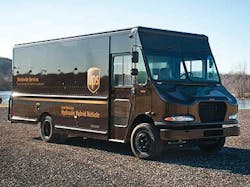UPS announced the deployment of 40 new hydraulic hybrid vehicles (HHVs) – 20 in Baltimore and 20 in Atlanta. Developed by Freightliner Custom Chassis Corporation (FCCC) and Parker Hannifin Corporation, the package cars can achieve up to 35 percent improved fuel economy and up to 30 percent CO2 emissions reduction over traditional diesel-powered vehicles that use automatic transmissions in stop-and-go applications.
Both deployments were supported in part by grants from the U.S. Department of Energy's Clean Cities program, which is focused on advancing the nation's economic, environmental, and energy security by supporting local actions to reduce petroleum consumption in transportation.
The HHVs in Baltimore will be deployed immediately while the vehicles in Atlanta will be introduced before the end of 2012. UPS currently has one HHV in operation in Laguna Hills, Calif., and has been working closely with manufacturers to develop and test HHV technology since 2006.
"Our long-term goal is to minimize our dependence on foreign energy and one way we will get there is through the deployment of a wide variety of technologies and designs in our fleet," stated Mike Britt, UPS director of alternative fuel vehicle engineering. "As early adopters of this technology, we are very pleased with the significant fuel economy and emission reductions that come from the HHVs."
The HHVs operate on two power sources – a fuel-efficient diesel combustion engine and advanced series hydraulic hybrid components. Energy created by the vehicle's continued braking action is stored in the HHV's hydraulic high-pressure accumulator, similar to what is done with electric motors and batteries in a hybrid electric vehicle. The HHV has a function to turn off the engine and drive the vehicle using the stored energy to propel the vehicle. This engine off strategy can reduce up to 90 minutes of engine run time in a typical route.
Because the HHVs efficiency relies on constant braking, the vehicles are best suited for urban routes, which typically involve frequent stopping and starting.
"We are proud to be a part of this exciting implementation to UPS's fleet," said Shane Terblanche, General Manager for Parker's Hybrid Drive Systems Division. "We fully anticipate that Parker's Hydraulic Hybrid technology for package delivery will provide outstanding bottom line results and support UPS's commitment towards a sustainable future."
Mike Stark, FCCC senior technical sales manager, national accounts, added, "In terms of fuel economy, range and performance, the HHV is ideal for challenging pickup and delivery routes like those served by UPS."
UPS currently operates 2,593 vehicles powered by alternative fuels or technology, including hybrid electric, electric, liquefied natural gas, compressed natural gas, bio-methane and propane-powered vehicles. As of 2011, UPS's alternative fuel and technology fleet has logged more than 240 million miles and is well on track to reach the company's goal of 400 million miles by 2017. For more information on UPS's sustainability initiatives, please review the company's 2011 Corporate Sustainability Report at http://responsibility.ups.com/Sustainability.


